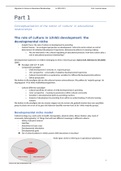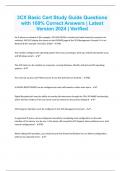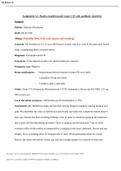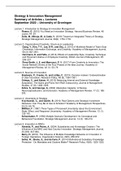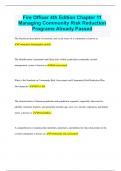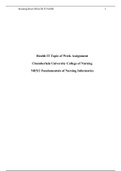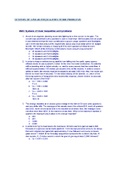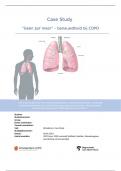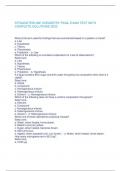Migration & Culture in Educational Relationships AJ 2020-2021 Prof. Lucia de Haene
Part 1
Conceptualization of the notion of ‘culture’ in educational
relationships
The role of culture in (child) development: the
developmental niche
- Analytic focus: the role of culture in development & parenting
- Central Premise – An ecological perspective on development: cultural & social context as central
determinant of individual development trajectories, behavioural patterns & meaning-making.
o We are interested in the cultural regulating of educational practices. How does culture play a
role in educational practices/relationships?
Developmental trajectories in children belonging to ethnic minority groups (Garcia Coll, Akerman & Chicchetti,
2006)
Paradigm shift (CP CDP)
- Comparative paradigm
o Child development in minority vs. majority groups
o ‘etic’ perspective – universality of adaptive developmental trajectories
o Cultural characteristics as explanatory variables for differential developmental patterns
o Deficit perspective
We denken in dit paradigma dat we alle culturen kunnen universaliseren. We pakken de ‘majority groups’ als
uitgangspunt de witte middenklassengezinnen.
- Cultural difference paradigm
o Cultural specificity of notions of child developmental & parenting
o ‘emic’ perspective – meaning & parameters within cultural community
o Variation in developmental paths & parenting practices
o Analysis of development & parenting from within an understanding of cultural meaning
systems
We denken in dit paradigma dat we moeten uitgaan van de normen die gedeeld worden door een specifieke
groep in plaats van ervan uit te gaan dat iedereen dezelfde normen kent als de ‘white majority groups’.
Developmental niche model
Cultural ecology (e.g. work cycles & health, demography, physical safety, labour division, play, level of
community heterogenetiy) Things that will have different meanings in different cultures.
- Safety of physical context
- Nutrition
- Attachment & basic trust
- Developmental stimulation
- Developmental goals
Set of cultural patterns in which parent-child interactions is inscribed
Niche (grey circle) is referring to 3 operational subsystems.
1
, Migration & Culture in Educational Relationships AJ 2020-2021 Prof. Lucia de Haene
Harkness & Super (1986) made the Developmental niche-model.
- Conceptualisation of the cultural regulation of the micro-context of child development
o Culture is usually seen as a part of the macrosystem (denk Bronfenbremmer), but Harkness &
Super see culture as a part of the microsystem
- Integration of perspectives: developmental psychology & anthropology
o Developmental psychology: limited focus on cultural structuring of developmental context
o Cultural anthropology: limited focus on children & parenting
- Focus on the role of culture in the micro-level of child developmental contexts: ‘ecocultural
perspective on development & parenting’
The developmental niche model:
- Physical & social setting
- Cultural parenting & care practices
- Psychology of caretakers: ‘parental ethnotheories’ / ‘parental belief systems’
o Cultural notions of child development & behaviours
o Developmental goals / parenting strategies / developmental needs
o Meaning-systems in understanding behaviour & interactions
The psychology of caretakers: children learn by observing adults, children see how adults behave and
that makes them learn. Adults behave in a certain culture, so children will learn/observe in a cultural
context.
Illustration – cultural socialisation: collectivistic vs. individualistic cultures
Collectivistic cultures (cultures of relatedness) (Kagitçibasi, 1996)
- Loyalty to family & cultural community
- Intra-familial & intergenerational interdependence
- Educational goals: obedience & dependency
- ‘relational self’
Individualistic cultures (cultures of seperatedness) (Kagitçibasi, 1996)
- Individual loyalties
A - Educational goals: autonomy & personal development
- ‘separated self’
Illustration -parental ethnotheories in diaspora (Bose, 2014)
- Migration & diaspora: parenthood & parenting as centrale ‘arena’ in negotiating cultural continuity and
change.
- Cultural change in parental belief systems: dynamic construction of meaning
- Qualitative exploration of ‘parental ethnotheories’ in Bangladeshi immigrant parents (UK)
o Parenting: creating space for developing life-trajectories in the context of the social & moral universe
of the Bangladeshi diasporic community
o Intrinsic connection between respect & obedience: the role of negotiation
o Individual in relation to extended family network & community (‘shomaj’)
o Parental understanding of cognitive development and parental involvement in school trajectories
o Strategies of disciplining & parental authority
o The absence of an external ‘community of consensus’: parental sensitivity for their children’s
fragmental moral world.
gradual conceptualization of culture
Gradual werkdefinitie van cultuur
Articulating a notion of culture based on anthropological, sociological frameworks & transcultural
psychiatry/psychology:
2
, Migration & Culture in Educational Relationships AJ 2020-2021 Prof. Lucia de Haene
- Static notion of culture: etno-specifity
o Collective legacy/herritage
o Culture – meaning systems
- Dynamic notion of culture: discursive perspective on culture/creolization
o Collective legacy with a focus on the mobile/active role of the individual
o Culture – meaning systems
o Culture – migration history
- Locus of social inequality
o Related to social-economical processes?
o Culture – social condition
- Discipline (theory/practice) as cultural institutions
o Culture – disciplinary frameworks/practices
Definitions of culture
‘[…] that complex whole which includes knowledge, belief, art, morals, law, custom, and any other capabilities
and habits acquired by man as a member of society.’
Tylor, 1871
Tylor refereert naar features die worden beheerd door mannen, specifieke karakteristieken/systemen
Collective heritage
‘[…] historically transmitted pattern of meanings embodied in symbols, a system of inherited conceptions
expressed in symbolic forms by means of which men communicate, perpetuate, and develop their knowledge
about and their attitudes toward life.’
Geertz, 1973
Volgens Geertz zien we transmitted patterns of meaning
Collective heritage blijft
2 accenten:
- Culture is being understood by meanings
- Which men communicate, perpetuate and develop actieve rol van de mens om de cultuur te
vormen en hervormen
Static notion of culture
Static notion of culture – group-based definitions
- Integrated, holistic system
o Fixed ecological set of behavioural patterns, values, and meaning-making
o Shared by the members of a community or society
- Consistent, homogeneous set of rules
- Singular cultural identity: monoculturalism
- Individual as representative of culture
o Individuals reflect a cultural identity monoculture
o The individual reflects the representativity of culture
E.g.: Characteristics of the group
Process of cultural transmission
- Interiorization through enculturation & socialization
o Culture features through interactions, food, way of holding, way of eye contact etc.
- Horizontal transmission within broader community
- Vertical transmission between generations
3
Part 1
Conceptualization of the notion of ‘culture’ in educational
relationships
The role of culture in (child) development: the
developmental niche
- Analytic focus: the role of culture in development & parenting
- Central Premise – An ecological perspective on development: cultural & social context as central
determinant of individual development trajectories, behavioural patterns & meaning-making.
o We are interested in the cultural regulating of educational practices. How does culture play a
role in educational practices/relationships?
Developmental trajectories in children belonging to ethnic minority groups (Garcia Coll, Akerman & Chicchetti,
2006)
Paradigm shift (CP CDP)
- Comparative paradigm
o Child development in minority vs. majority groups
o ‘etic’ perspective – universality of adaptive developmental trajectories
o Cultural characteristics as explanatory variables for differential developmental patterns
o Deficit perspective
We denken in dit paradigma dat we alle culturen kunnen universaliseren. We pakken de ‘majority groups’ als
uitgangspunt de witte middenklassengezinnen.
- Cultural difference paradigm
o Cultural specificity of notions of child developmental & parenting
o ‘emic’ perspective – meaning & parameters within cultural community
o Variation in developmental paths & parenting practices
o Analysis of development & parenting from within an understanding of cultural meaning
systems
We denken in dit paradigma dat we moeten uitgaan van de normen die gedeeld worden door een specifieke
groep in plaats van ervan uit te gaan dat iedereen dezelfde normen kent als de ‘white majority groups’.
Developmental niche model
Cultural ecology (e.g. work cycles & health, demography, physical safety, labour division, play, level of
community heterogenetiy) Things that will have different meanings in different cultures.
- Safety of physical context
- Nutrition
- Attachment & basic trust
- Developmental stimulation
- Developmental goals
Set of cultural patterns in which parent-child interactions is inscribed
Niche (grey circle) is referring to 3 operational subsystems.
1
, Migration & Culture in Educational Relationships AJ 2020-2021 Prof. Lucia de Haene
Harkness & Super (1986) made the Developmental niche-model.
- Conceptualisation of the cultural regulation of the micro-context of child development
o Culture is usually seen as a part of the macrosystem (denk Bronfenbremmer), but Harkness &
Super see culture as a part of the microsystem
- Integration of perspectives: developmental psychology & anthropology
o Developmental psychology: limited focus on cultural structuring of developmental context
o Cultural anthropology: limited focus on children & parenting
- Focus on the role of culture in the micro-level of child developmental contexts: ‘ecocultural
perspective on development & parenting’
The developmental niche model:
- Physical & social setting
- Cultural parenting & care practices
- Psychology of caretakers: ‘parental ethnotheories’ / ‘parental belief systems’
o Cultural notions of child development & behaviours
o Developmental goals / parenting strategies / developmental needs
o Meaning-systems in understanding behaviour & interactions
The psychology of caretakers: children learn by observing adults, children see how adults behave and
that makes them learn. Adults behave in a certain culture, so children will learn/observe in a cultural
context.
Illustration – cultural socialisation: collectivistic vs. individualistic cultures
Collectivistic cultures (cultures of relatedness) (Kagitçibasi, 1996)
- Loyalty to family & cultural community
- Intra-familial & intergenerational interdependence
- Educational goals: obedience & dependency
- ‘relational self’
Individualistic cultures (cultures of seperatedness) (Kagitçibasi, 1996)
- Individual loyalties
A - Educational goals: autonomy & personal development
- ‘separated self’
Illustration -parental ethnotheories in diaspora (Bose, 2014)
- Migration & diaspora: parenthood & parenting as centrale ‘arena’ in negotiating cultural continuity and
change.
- Cultural change in parental belief systems: dynamic construction of meaning
- Qualitative exploration of ‘parental ethnotheories’ in Bangladeshi immigrant parents (UK)
o Parenting: creating space for developing life-trajectories in the context of the social & moral universe
of the Bangladeshi diasporic community
o Intrinsic connection between respect & obedience: the role of negotiation
o Individual in relation to extended family network & community (‘shomaj’)
o Parental understanding of cognitive development and parental involvement in school trajectories
o Strategies of disciplining & parental authority
o The absence of an external ‘community of consensus’: parental sensitivity for their children’s
fragmental moral world.
gradual conceptualization of culture
Gradual werkdefinitie van cultuur
Articulating a notion of culture based on anthropological, sociological frameworks & transcultural
psychiatry/psychology:
2
, Migration & Culture in Educational Relationships AJ 2020-2021 Prof. Lucia de Haene
- Static notion of culture: etno-specifity
o Collective legacy/herritage
o Culture – meaning systems
- Dynamic notion of culture: discursive perspective on culture/creolization
o Collective legacy with a focus on the mobile/active role of the individual
o Culture – meaning systems
o Culture – migration history
- Locus of social inequality
o Related to social-economical processes?
o Culture – social condition
- Discipline (theory/practice) as cultural institutions
o Culture – disciplinary frameworks/practices
Definitions of culture
‘[…] that complex whole which includes knowledge, belief, art, morals, law, custom, and any other capabilities
and habits acquired by man as a member of society.’
Tylor, 1871
Tylor refereert naar features die worden beheerd door mannen, specifieke karakteristieken/systemen
Collective heritage
‘[…] historically transmitted pattern of meanings embodied in symbols, a system of inherited conceptions
expressed in symbolic forms by means of which men communicate, perpetuate, and develop their knowledge
about and their attitudes toward life.’
Geertz, 1973
Volgens Geertz zien we transmitted patterns of meaning
Collective heritage blijft
2 accenten:
- Culture is being understood by meanings
- Which men communicate, perpetuate and develop actieve rol van de mens om de cultuur te
vormen en hervormen
Static notion of culture
Static notion of culture – group-based definitions
- Integrated, holistic system
o Fixed ecological set of behavioural patterns, values, and meaning-making
o Shared by the members of a community or society
- Consistent, homogeneous set of rules
- Singular cultural identity: monoculturalism
- Individual as representative of culture
o Individuals reflect a cultural identity monoculture
o The individual reflects the representativity of culture
E.g.: Characteristics of the group
Process of cultural transmission
- Interiorization through enculturation & socialization
o Culture features through interactions, food, way of holding, way of eye contact etc.
- Horizontal transmission within broader community
- Vertical transmission between generations
3

